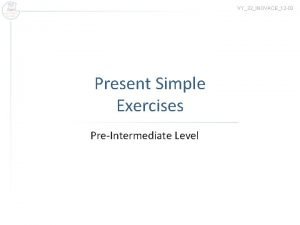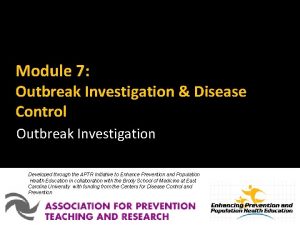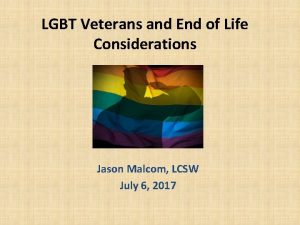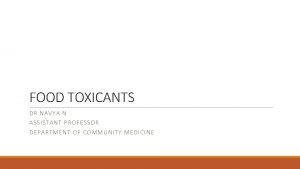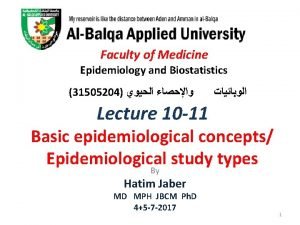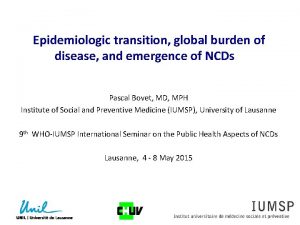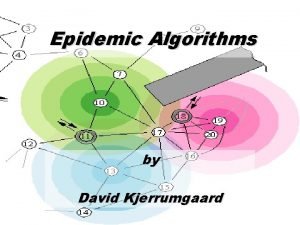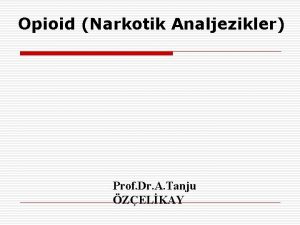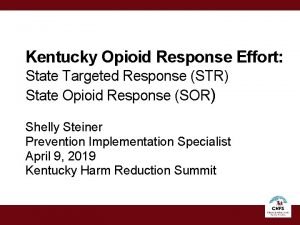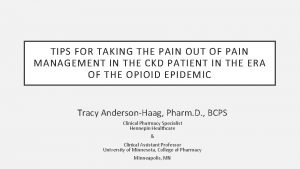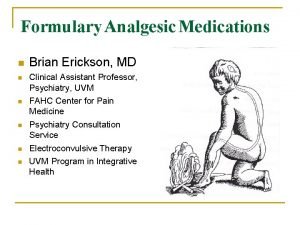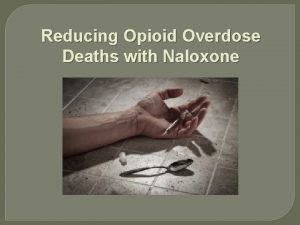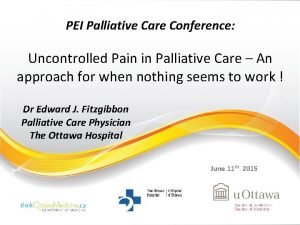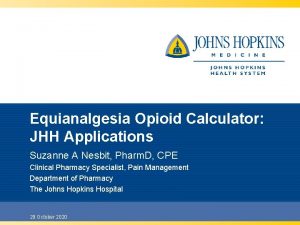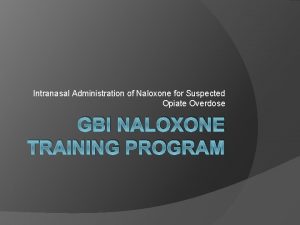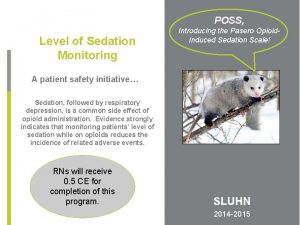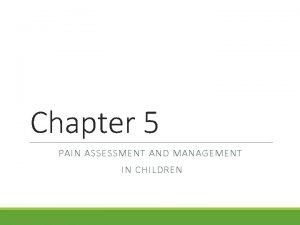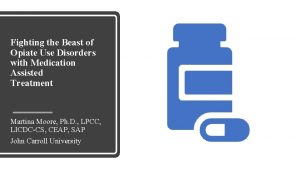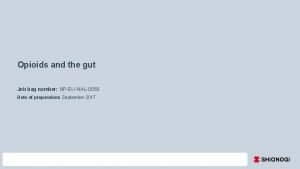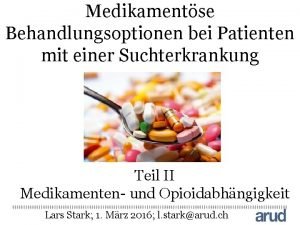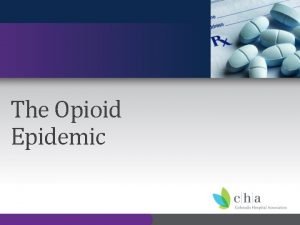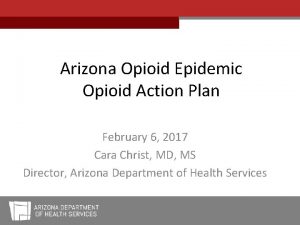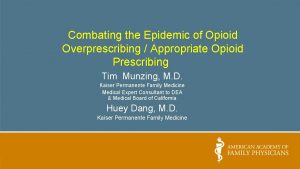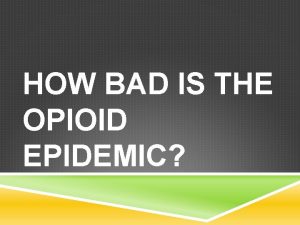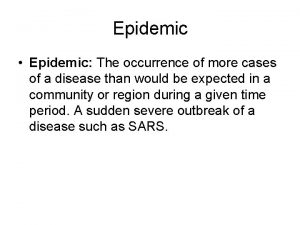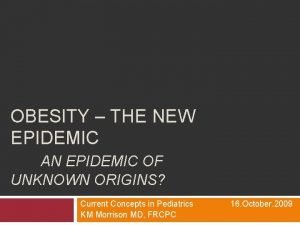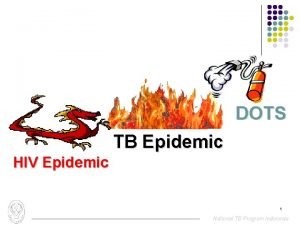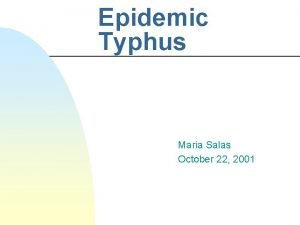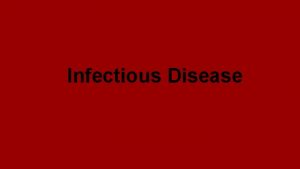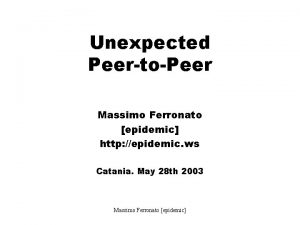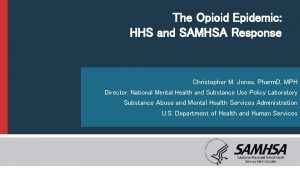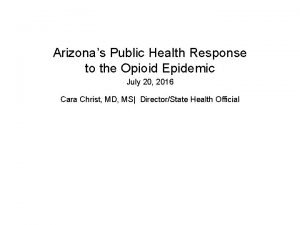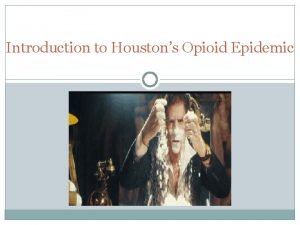How We Got Here The Opioid Epidemic Drug
















































- Slides: 48


How We Got Here: The Opioid Epidemic: Drug Addiction, Seniors & The “House of Medicine” S. Marshal Isaacs, MD, FACEP, FAEMS Professor of Emergency Medicine, UT Southwestern Medical Director UTSW/Bio. Tel EMS System Dallas Fire-Rescue Department Prehospital Care and Bio. Tel, Parkland Health & Hospital System Chair, Parkland/UTSW COPPRA Committee Co-Chair, Dallas County Medical Society Physician Wellness Committee

Objectives ü To understand why an Emergency/EMS physician would be interested in the problem of Substance Use Disorders. ü To better understand the opioid epidemic and how we got here. ü To recognize that the problem of drug addiction is prevalent among seniors. ü To describe my personal interest in drug addiction. ü To discuss the need for further education & training regarding drug addiction for physicians and senior patients and to reduce the stigma surrounding addiction and treatment.

Sobering Centers and Serial Inebriate Programs San Diego: January 2000, the Serial Inebriate Program began an innovative effort involving the City and County of San Diego, the San Diego Police and Sheriff's Departments, San Diego County Superior Courts, San Diego County Health and Human Services and Mental Health Systems, Inc. San Francisco launched a “Sobering Center” in 2005 and a Serial Inebriate Program in 2013. Dallas has been working to develop a program for the past year and a half.

Why Develop Such Programs? The primary goal is to diminish the burden of serial inebriates on the 911 emergency medical care system: -EMS -Fire Service -Police -Emergency departments -Judicial system

Why Develop Such Programs? The secondary goal is to attempt to break the cycle of alcoholism and drug addiction and thus to improve the lives of these patients.

Scope of the Problem It is estimated that up to 10% of all 911 EMS responses are for patients with alcohol and drug related issues, many of whom come into contact with police, fire and EMS on a regular basis.

The Dark Truth Ø The US consumes 60% of the world’s illicit drugs. Ø 18 million Americans abuse alcohol. Ø 20 million Americans regularly use prescription medication for non-medical reasons. Ø You may be surprised to learn that 75% of substance abusers are employed. Ø How many are senior citizens?

The Opioid Epidemic Ø Evolved rapidly over the past 3 decades. Ø Multifactorial but mostly related to over-prescribing of opioid pain medications to treat both acute and chronic pain Ø Increase in use of heroin, including among those who had become dependent on opioids but could not longer obtain them due to tightening of prescribing rules Ø Synthetic opioids (fentanyl) have become a problem in recent years

How Did We Get Here?

Opioids

Is This REALLY An Epidemic?

Are People REALLY Dying From Opioids? A Brief History of the Opioid Epidemic and Strategies for Pain Medicine Mark R. Jones, Omar Viswanath, 1 Jacquelin Peck, 2 Alan D. Kaye, 3 Jatinder S. Gill, 1 and Thomas T. Simopoulos 1 1

Seniors and Opioids • • • Drug and alcohol abuse among the elderly is a rapidly growing health problem in the United States. Addiction among people 65 and up is often underestimated and underdiagnosed, which can prevent them from getting the help they need. According to the Prevention Tactics report, “prescription drug abuse is present in 12 to 15% of elderly individuals who seek medical attention. The Johns Hopkins Medical School notes that the number of Americans over age 50 abusing prescription drugs is projected to rise to 2. 7 million in 2020 — a 190% increase from the 2001 figure of 910, 000.

Seniors and Addiction Potential triggers for drug or alcohol addiction in the elderly are: • Retirement • Death of a family member, spouse, pet or close friend • Loss of income or financial strains • Relocation or placement in a nursing home • Trouble sleeping • Family conflict • Mental or physical health decline (depression, memory loss, major surgeries, etc. )

Why are older adults at risk for prescription drug abuse? • Most older adults who suffer from prescription drug abuse do so by accident. They take more medicine than other age groups. According to the Substance Abuse and Mental Health Services Administration (SAMHSA), about 3 in 10 people between ages 57 to 85 use at least 5 prescriptions. This increases the risk for mistakes and drug abuse. • Growing older also slows down your body’s ability to absorb and filter medicines. This means that an older adult might become addicted to or have side effects from a prescription drug at a lower dose than a younger adult.

How Do We Help?

4 Steps To Help Someone When They Don't Want It 1. Remember the journey to accept there is a problem to deal with is theirs alone. Though you can help prep the ground, by having discussions and listening with an open heart, by setting clear boundaries, by offering information when appropriate. 2. Ask your loved one to humor you and go to see the doctor together. 3. Rebuild trust and rapport. Your adult son or daughter, brother or parent may continue to get angry when you suggest anything. The trick is for you to NOT get angry back. Easier said than done. 4. Evaluate whether you really are the best person to talk to your loved right now. -Victoria Maxwell, Psychology Today

Physicians MD’s are not immune from Substance Use Disorders (SUD).

Chemical Dependency and the Physician Mayo Clin Proc. Jul 2009; 84(7): 625– 631. PMCID: Keith H. Berge, MD, Marvin D. Seppala, MD, and Agnes M. Schipper, JD Approximately 10% to 12% of physicians will develop a substance use disorder during their careers, a rate similar to or exceeding that of the general population. “Although physicians' elevated social status brings many tangible and intangible rewards, it also has an isolating effect when they are confronted with a disease such as addiction, which has a social stigma. This isolation can lead to disastrous consequences, both in delaying the recognition of and in intervening in the disease process, as well as in the attendant risk of death by inadvertent overdose or suicide. ”

Anonymous Survey of ETOH/ Drug Use Among Physicians

Attitudes Toward Alcoholics & Drug Addicts When doctors are asked to describe people with alcohol and drug addiction, the following words are used…


Some Alcoholics Look Like This…

Some Drug Addicts Look Like This…

BUT, SOME LOOK LIKE THIS…


The ONLY thing that separates ME from the any other addict is the level of resources and support I was given.

The Definition of Insanity Doing the same thing over and over again expecting a different outcome.

The Walking Dead Many alcoholics and drug addicts eventually no longer wish to continue to live while drinking or using, yet cannot imagine a life without alcohol or drugs. This is “the jumping off place”.

Intensive Monitoring For 5 Years

Why Have I Chosen To Share This With You Today? So you may help save someone’s life. OR, you may need to help save the career and life of a colleague. Or perhaps even your own….

DO NOT BE AN ENABLER!

What Not To Do: – Do NOT look the other way – Do NOT cover for the person – Do NOT intervene on your own – Do NOT avoid asking questions that might force a person to face their problems – Do NOT fail to act because you are concerned that you might get a person “in trouble”. If YOU think YOU may have a problem, GET HELP!!!

COPPRA

What is COPPRA? Committee On Practitioner Peer Review & Assistance

What is COPPRA? • It is a formally-constituted peer review committee serving UTSW, Parkland, CMC and the VA. • COPPRA addresses practitioner health and rehabilitation issues. • COPPRA’s proceedings and decisions are protected from disclosure. • COPPRA’s referrals and interactions are privileged and confidential and are non discoverable. • COPPRA provides advocacy for cooperative practitioners (rehabilitate, rather than punish).

What is COPPRA’s Mission? • To ensure that no patient is injured as a consequence of practitioner impairment and/or disruptive behavior. • To ensure that an affected practitioner receives rapid/effective/confidential treatment when indicated.

Who Are The Members Of COPPRA? Dr. Marshal Isaacs, Chair (Department of Emergency Medicine) Marshal. Isaacs@UTSouthwestern. edu • Dr. Paige Marnell, Vice Chair (Department of Psychiatry) paige. marnell@UTSouthwestern. edu • Dr. Mary Brett (Department of Psychiatry) mary. brett@UTSouthwestern. edu • Dr. Babatunde Ogunnaike (Department of Anesthesia) Babatunde. Ogunnaike. UTSouthwestern. edu • Dr. Kara Bennett (Department of Anesthesia) Kara. Bennett@UTSouthwestern. edu • Dr. Michael Rubin (Department of Neurology) Michael. Rubin@UTSouthwestern. edu • Dr. Temple Howell-Stampley (Department of Internal Medicine) Temple. Howell-Stampley@utsouthwestern. edu •

Members Of COPPRA Dr. Walter Kutz (Department of Otolaryngology) Walter. Kutz@utsouthwestern. edu Dr. Jun Sasaki (Department of Anesthesiology) Jun. Saski@utsouthwestern. edu Janet Sumner, RN, PNP, Ph. D (Advanced Practice Professional) Janet. Sumner@phhs. org Elizabeth Ponce, COPPRA Co-Facilitator Graduate Medical Education Office, PHHS Elizabeth. Ponce@phhs. org Gabriela “Gaby” Pinto, COPPRA Co-Facilitator Graduate Medical Education Office, PHHS Gabriela. Pinto@phhs. org Laura Moore, COPPRA Co-Facilitator Medical Staff Professional Services & Regulatory Affairs, PHHS Laura. Moore@phhs. org

Worrisome Behaviors • • • Excessive absenteeism or tardiness Difficulties in diagnosis and management of patients Abnormal behavior during rounds Embarrassing/unpredictable behavior Hostile behavior to patients/staff Inappropriate orders Depression Mood swings Poor concentration Deterioration in personal hygiene Isolation, withdrawal from activities, family and friends Self-prescribing

What Do We Need? We need better education & training to avoid developing problem drinking and drug use among seniors. We need to foster a better understanding in medicine of alcoholism and drug addiction. We need to adopt less judgmental attitudes towards alcoholics & drug addicts. We need better recognition of warning signs and problems in seniors. . We need the best possible policies geared toward recognition, treatment, rehabilitation and return to duty. We need more funding, more research, more treatment, more support.

Remember… “These are the duties of a physician: First. . . to heal his mind and to give help to himself before giving it to anyone else. ” ~ Epitaph of an Athenian doctor, AD 2. “Addiction doesn’t come heralded by a brass band, it sneaks up on you, and sometimes with extraordinary speed. ” ~C. Everett Koop (former US Surgeon General), 2003

We Don’t Throw These People Away! We don’t throw our seniors away… Turns out Nancy Reagan had it right!

“Not everyone can be a hero but everyone can be great, because greatness is determined by service. ” -Martin Luther King, Jr.


In Humble Gratitude… Dallas Area Gerontological Society Peggy Papert LCSW UT Southwestern The COPPRA Committee Parkland Health & Hospital System

Thank You for Your Attention !!!
 Have got has got exercises
Have got has got exercises Sta je present simple
Sta je present simple Family and friends 2 lesson 6
Family and friends 2 lesson 6 Endemic epidemic
Endemic epidemic Epidemic dropsy
Epidemic dropsy Aids epidemic
Aids epidemic Epidemic dropsy
Epidemic dropsy Endemic epidemic
Endemic epidemic Doctors attributed the epidemic to the rampant
Doctors attributed the epidemic to the rampant Obesity and bone health
Obesity and bone health David kjerrumgaard
David kjerrumgaard To kill a mockingbird quotes quiz
To kill a mockingbird quotes quiz Exhausted drug
Exhausted drug Narkotik analjezikler
Narkotik analjezikler Kentucky opioid response effort
Kentucky opioid response effort Non-opioid
Non-opioid Non-opioid
Non-opioid Opioid overdose
Opioid overdose Mechanism of action of opioid analgesics
Mechanism of action of opioid analgesics Suzanne nesbit
Suzanne nesbit Opioid overdose
Opioid overdose What is pain
What is pain Poss scale vs rass scale
Poss scale vs rass scale Non-opioid
Non-opioid Opioid overdose
Opioid overdose Opioid receptors location
Opioid receptors location Opioid umrechnungstabelle
Opioid umrechnungstabelle There's a place where mercy reigns and never dies
There's a place where mercy reigns and never dies Thế nào là hệ số cao nhất
Thế nào là hệ số cao nhất Sơ đồ cơ thể người
Sơ đồ cơ thể người Tư thế ngồi viết
Tư thế ngồi viết Các số nguyên tố
Các số nguyên tố đặc điểm cơ thể của người tối cổ
đặc điểm cơ thể của người tối cổ Mật thư anh em như thể tay chân
Mật thư anh em như thể tay chân Thang điểm glasgow
Thang điểm glasgow ưu thế lai là gì
ưu thế lai là gì Thẻ vin
Thẻ vin Cái miệng nó xinh thế
Cái miệng nó xinh thế Thể thơ truyền thống
Thể thơ truyền thống Các châu lục và đại dương trên thế giới
Các châu lục và đại dương trên thế giới Bổ thể
Bổ thể Từ ngữ thể hiện lòng nhân hậu
Từ ngữ thể hiện lòng nhân hậu Tư thế ngồi viết
Tư thế ngồi viết Diễn thế sinh thái là
Diễn thế sinh thái là Thứ tự các dấu thăng giáng ở hóa biểu
Thứ tự các dấu thăng giáng ở hóa biểu Làm thế nào để 102-1=99
Làm thế nào để 102-1=99 Hát lên người ơi
Hát lên người ơi Khi nào hổ con có thể sống độc lập
Khi nào hổ con có thể sống độc lập đại từ thay thế
đại từ thay thế
